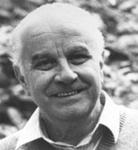
History
Loris Malaguzzi founder of Reggio Emilia philosophy designed an education whose main goal was to
stimulate the children to train all their senses, all their hundred languages.
stimulate the children to train all their senses, all their hundred languages.
Loris Malaguzzi was head of the municipal childcare in Reggio Emilio in Italy until 1985, after his retirement he was his educational consultant. He clearly remembered how everything began. It was a few days after the liberation of 1944 and everything was a violent wild game. The phones did not work, rumors went but no one knew if they were true. Malaguzzi took the bike out to Villa Cella. There were piles of sand and stone. Under a roof of rags to protect against the sun stood two women and put the hammer and bristle bricks clean from lime and old mortar. The stones were taken from tattered houses. The rumors were therefore true. The brick was laid on bricks in an initiative deriving from the wide-ranging population of the population. Then the day-care center "XXV Aprile" came to bear its name after the liberation. The day care center exists today. In 1963, it was transferred to Reggio Emilia's property.
Reggio Emilia is a city about Uppsala's size almost three hours by train from Milan and less than an hour from Bologna. Reggio is located on the foothills of the Puffin's plain plain in the province of Emilia-Romagna. During the war, the city was a strong attachment to fascism and it also has strong roots in cooperative and democratic traditions.
After the first day-care center in Villa Cella in 1944, six small day-care centers were spontaneously built for the next two years, administered and run by women with voluntary efforts and with a small financial support from the Communist Party. From the outset, the municipality would take over the day-care centers, but were opposed by government agencies and churches who wanted to maintain their monopoly over the children's education.
In order for everyone to see how they worked, they went out to Piazzor (square) and parked and showed how they worked. In the fight on quality, Loris Malaguzzi has had a decisive significance. In his education, he was a psychologist and educator with a background as teacher for both children and adults and as a theater worker and editor of a newspaper. He fought for quality and creativity in childcare.
"One child has one hundred languages
but deprived of ninety nine.
School and culture
separates the head from the body.
They force one to think without body
and shop without head.
The game and the work,
reality and imagination
made to each other's opposites. "
This poem is written by Loris Malaguzzi, who formulates his criticism of society. He designs an education whose main goal was to stimulate the children to train all their senses, all their hundred languages. A training that must start during the most important stage of development in a child's life: pre-school period. Loris Malaguzzi founder of Reggio Emilia's special childcare philosophy died on January 30, 1994. He dared to fight for his vision of the children and their rights. He was a leader guided by his approach and conviction.

